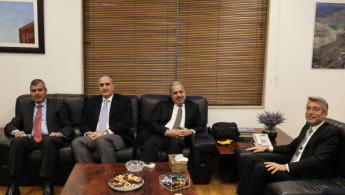Jordanian, Syrian and Lebanese leaders sign energy deal in Beirut
The energy ministers of Jordan, Syria and Lebanon met in Beirut on Wednesday to sign an energy deal which would bring natural gas and electricity to Lebanon in the coming months.
The energy plan would see natural gas come from Egypt, into Jordan, through Syria, and finally into Lebanon. Some of the natural gas would be used to generate electricity in Jordan, sent to Syria, and then transferred to Lebanon through an electrical hookup between the two countries.
The deal would provide around 450 megawatts of additional electricity to Lebanon, or about three more hours of state-supplied power a day. Currently, the state power grid only provides about two hours of electricity a day.
Thursday’s deal is designed to insulate the three countries from the US Caesar Act, which imposes sanctions on anyone who engages in business with the Syrian regime. Although the US has given assurances that the deal would not fall under the Caesar Act, it has yet to issue a formal exemption or guarantee to the four countries involved in the agreement.
US Ambassador to Lebanon Dorothy Shea carried a letter from the US Treasury to Beirut on 14 January, which told the Lebanese not to worry about Caesar sanctions. The letter, according to an unconfirmed leaked copy published in Lebanese media, also sought clarification from the four involved parties to make sure that the energy deal would not fall under sanctionable activity.
Egypt was notably absent from the signing of the energy deal, amidst reports that the country needs more assurances that it will be exempted from US sanctions.
The four-country deal to bring Lebanon power was given US blessing in an announcement in August and was styled as a form of humanitarian relief for the power-starved country.
In late December, Lebanese Energy Minister Walid Fayyad told Reuters that repairs of the Arab Gas Pipeline in Lebanon should be complete by the end of February – a prerequisite to any natural gas reaching Lebanon.
Currently, the connections linking Syria and Lebanon's power grids are out of service, but on Wednesday Syria's Electricity Minister Ghassan al-Zamel said Damascus would provide "all facilitations" to ensure the integrity of the electricity connection between the two countries.
The funding of the deal remains unclear, but a significant portion of it will be reportedly paid for by the World Bank.
In comments made to Lebanese outlet L’Orient Today on Wednesday, World Bank Regional Director Saroj Kumar Jha said that the Lebanese government had requested $250 million to finance the deal. He added that World Bank funding would be contingent on the Lebanese government passing reforms to its energy sector, widely regarded as wasteful and riddled with corruption.
While a US State Department official made comments indicating that they did not expect energy reforms to be delayed in Lebanon, the country’s political system has proven cumbersome in the past. Lebanon’s parliament, dominated by different sectarian parties, has been paralyzed by gridlock since the October revolution in 2019.
Passing what international organisations deem as “common-sense” reforms to unlock badly-needed international aid has so far proven impossible for Lebanon. The country’s cabinet met for the first time in three months on Monday, after Hezbollah and Amal movement-blocs had boycotted the government in protest of the ongoing investigation into the 4 August Beirut port blast.





 Follow the Middle East's top stories in English at The New Arab on Google News
Follow the Middle East's top stories in English at The New Arab on Google News
![The UAE is widely suspected of arming the RSF militia [Getty]](/sites/default/files/styles/image_330x185/public/2024-11/GettyImages-472529908.jpg?h=69f2b9d0&itok=Yauw3YTG)
![Netanyahu furiously denounced the ICC [Getty]](/sites/default/files/styles/image_330x185/public/2024-11/GettyImages-2169352575.jpg?h=199d8c1f&itok=-vRiruf5)
![Both Hamas and the Palestinian Authority welcomed the ICC arrest warrants [Getty]](/sites/default/files/styles/image_330x185/public/2024-11/GettyImages-2178351173.jpg?h=199d8c1f&itok=TV858iVg)